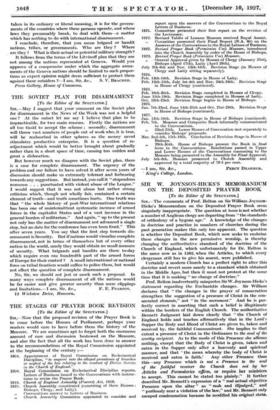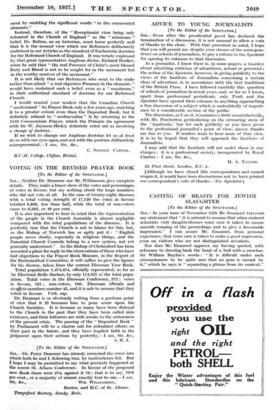SIR W. JOYNSON-B1CKS'S MEMORANDUM ON THE DEPOSITED PRAYER BOOK
[To the Editor of the SPECTATOR.] Sue,—The comments of Prof. Relton on Sir William Joynson- Hicks's Memorandum on the Deposited Prayer Book seem singularly inappropriate. The question at issue is not whether a number of Anglican clergy are departing from the standards of orthodoxy of a bygone age." A knowledge of the changes in doctrine and practice in numbers of churches during the past generation makes this only too apparent. The question is whether the Deposited Book, which now seeks to enshrine these changes in the new permissive worship, is thereby changing the authoritative standard of the doctrine of the Church of England, which unfortunately for Dr. Relton is the same now as in 1562, when the Articles, to which every clergyman still has to give his assent, were published.
Certainly a modern Church has a perfect right to alter this doctrine and revert more nearly to a standard which obtained in the Middle Ages, but then it must not protest at the same time that it is making "no change of doctrine."
Prof. Relton inadvertently misquotes Sir W. Joynson-Ilicks's statement regarding the Eucharistic changes. Sir William declares that "the changes in the prayer of consecration strengthen the suggestion of a presence of Christ in the con- secrated elements," not in the sacrament." And he is per- fectly correct in asserting that such a belief is illegitimate within the borders of the English Church. The authoritative Bennett Judgment laid down clearly that "the Church of England holds and teaches affirmatively that in the Lord's Supper the Body and Blood of Christ are given to, taken and received by, the faithful Communicant. She implies to that extent a presence of Christ in the Ordinance to the soul of the worthy recipient. As to the mode of this Presence she affirms nothing, except that the Body of Christ is given, taken and eaten in the Supper only after a heavenly and spiritual manner, and that 'the mean whereby the body of Christ is received and eaten is faith.' Any other Presence than this—any Presence which is not a Presence to the soul of the faithful receiver the Church does not by- her Articles and Formularies affirm, or require her ministers to accept. This cannot be stated too plainly." It further described Mr. Bennett's expression of a "real actual objective Presence upon the altar-" as "rash and illjudged," and "perilously near a violation of the law," and Mr. Bennett only escaped condemnation because he modified his original state.
meat by omitting the significant words "in the consecrated elements."
Instead, therefore, of the "Receptionist view being only tolerated in the Church of England" as the " minimum " belief, Dr. Relton, as an historian, must know perfectly well that it is the normal view which our Reformers deliberately enshrined in our Articles as the standard of Eucharistic doctrine for the Reformed Church of England. It was tersely expressed by that great representative Anglican divine, Richard Hooker, when he said that "the real Presence of Christ's most blessed Body and Blood is not to be sought for in the sacrament but in the worthy receiver of the sacrament."
It is not likely that our Reformers who went to the stake rather than admit "a real objective Presence in the elements" would have enshrined such a belief, even as a "maximum," in their authorized standard of doctrine for our Reformed Church.
I would remind your readers that the Canadian Church "modernized " its Prayer Book only a few years ago, enriching it to a greater extent even than the Deposited Book, but it definitely refused to " mediaevalize " it by returning to the 1549 Consecration Prayer, which the Primate (in agreement with Sir W. Joynson-Hicks) definitely ruled out as involving a change of doctrine.
If we wish to change our Anglican doctrine let us at least do so with our eyes open, and not with the position deliberately misrepresented.—I am, Sir, .&c.,











































 Previous page
Previous page